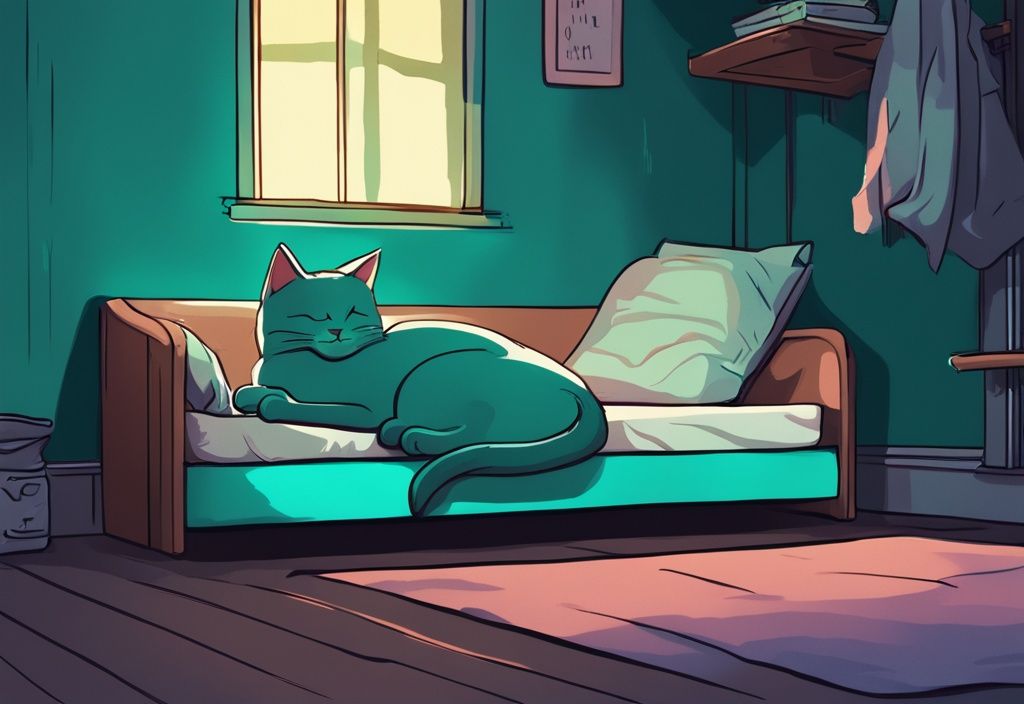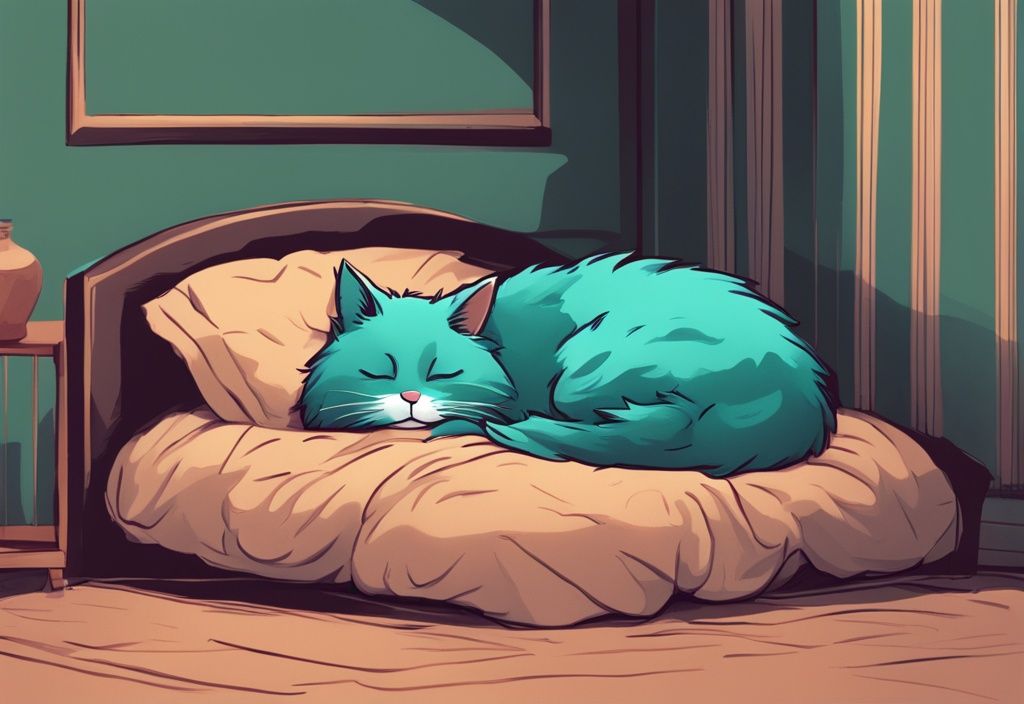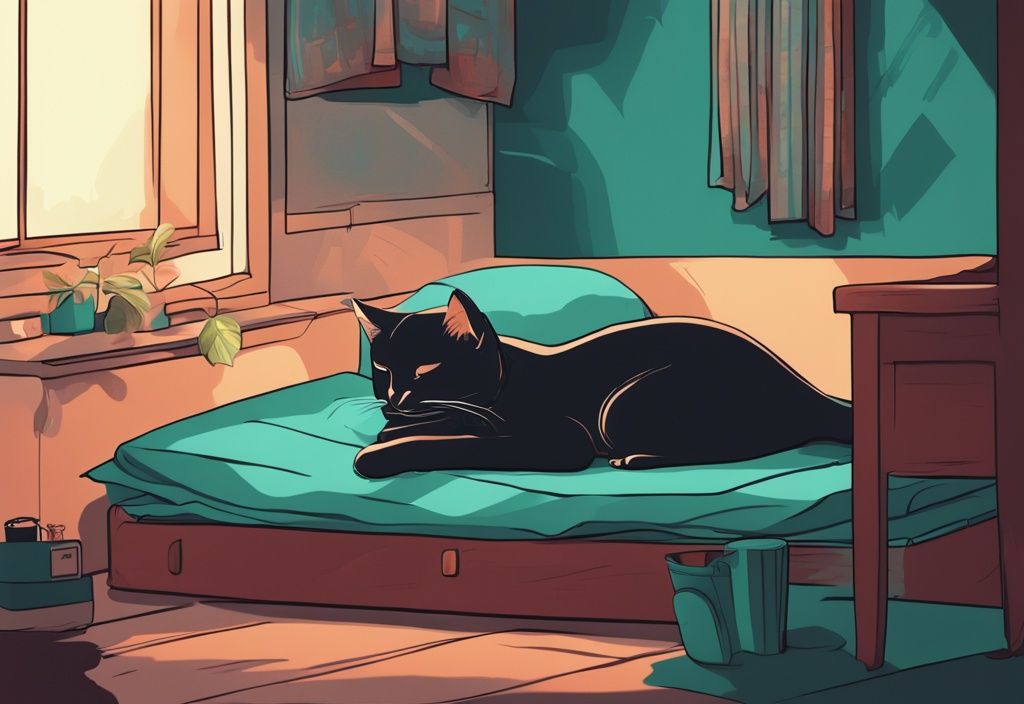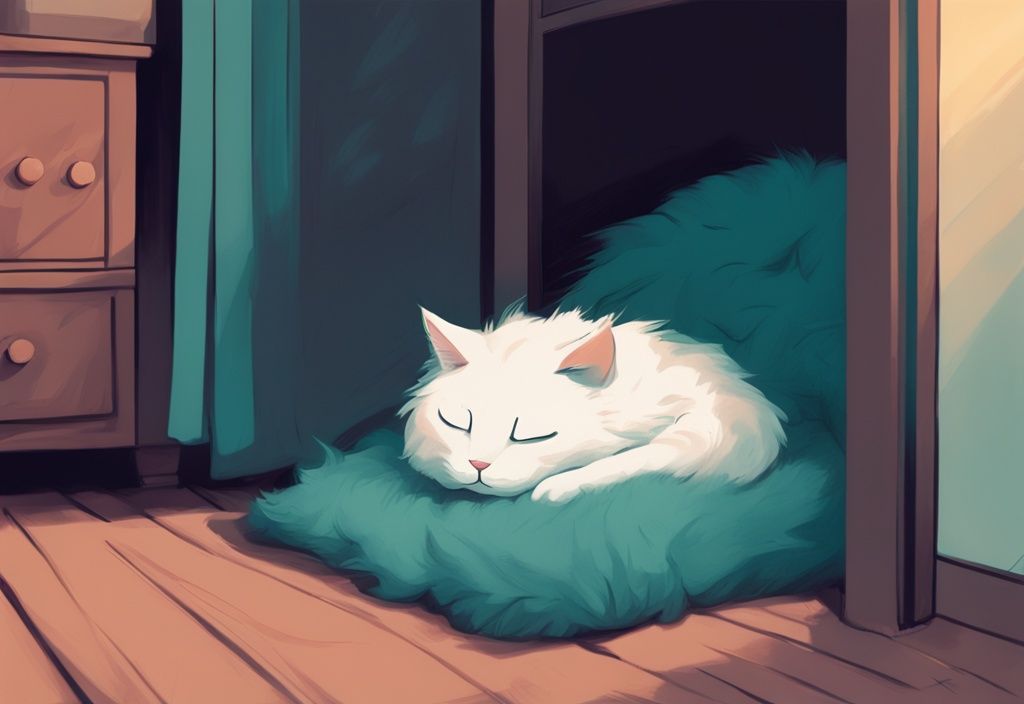Ever found yourself trying to coax Whiskers out from under the bed, wondering why she’s chosen your boxspring as her preferred sleep spot? This isn’t just a quirky habit, it’s a curious behavior shared by felines worldwide! As an fervent pet lover and guardian to my darling Whiskers, I’ve often pondered “why does my cat sleep under the bed?” and I bet you’re in the same boat.
Well, fret not! Our cats are simply practicing their instinctual need for safety and warmth. But sometimes, Whiskers is just trying to announce some changes, maybe health or environment-related. In this cozy chat, we’ll unveil the true reasoning behind this behavior, providing practical ways to accommodate it while enhancing your furry friend’s comfort.
So, ready to dive under the bed and into the mind of your beloved kitty? Keep reading, fellow cat parents!
Common Reasons Cats Sleep Under the Bed
Cats are mysterious, aren’t they? One minute they’re sunbathing on your favorite chair, the next they’re tucked away under the bed. So, why does your cat sleep under the bed? Let’s unravel some common reasons.
Seeking Safety and Security
Cats naturally gravitate towards cozy, dark, and undisturbed areas for their naps, making the space under the bed an ideal choice. This behavior is deeply rooted in their need for a secure, protected space where they feel less exposed to potential threats. By sleeping under the bed, they can observe their surroundings without being easily seen, which ties into their innate hunting instincts. Over time, if a cat considers under the bed its territory, it may choose to sleep there as a way to demonstrate ownership.
Anxiety and Disrupted Routines
Sometimes, our feline friends sleep under beds due to anxiety, especially when their normal routine is disrupted or they sense a threat. New guests or unfamiliar people in the house can cause cats to hide, as they encounter new smells and noises that can be unsettling. Sudden loud noises, such as thunderstorms or fireworks, or the presence of young children can also push a cat to seek refuge under the bed. Over time, hiding under the bed may become a habitual response if the cat consistently associates this space with safety during stressful situations.
Response to Changes in the Environment
Significant changes in the household, such as moving, new furniture, or renovations, can prompt cats to hide in familiar, comforting places like under the bed. The introduction of a new pet to the household often drives a cat to seek sanctuary under the bed to avoid interactions with a rambunctious new animal. When a cat is new to a home or environment, it may initially choose to stay under the bed, as it seeks refuge until it becomes comfortable with its surroundings.
Health-Related Reasons
Illness or injury can lead a cat to hide under the bed, as they instinctively seek protection when feeling vulnerable. Pregnant cats may also hide under the bed during their nesting phase, typically a day or two before giving birth. Some cats may hide as a coping mechanism when they are ill or nearing the end of their lives. Additionally, if there is an issue with parasites like fleas, a cat might sleep under the bed to avoid other infested areas in the home.

How to Deal With Your Cat Sleeping Under the Bed
Blocking Access to Under the Bed
Understanding why does my cat sleep under the bed is essential to address this behavior effectively.
Imagine this: you’re ready for bed, but Whiskers, your curious kitty, vanishes into the shadowy depths beneath your bed. Jackson Galaxy, the cat whisperer, suggests preventing our feline friends from accessing these hidey-holes. Blocking access to under the bed is like removing a secret escape route—crucial for those “just in case” moments. Plus, it stops fear-based habits from becoming ingrained. By preventing your cat from hiding under the bed, you’re encouraging it to face and conquer anxieties in a more controlled environment.
Providing Alternative Hiding Spots
If your cat seeks refuge under the bed, it’s crucial to understand why does my cat sleep under the bed and provide alternative options. Imagine Whiskers feeling at home in safe and cozy spots like boxes, covered cat beds, or cat caves. These alternatives create a secure environment. Understanding the reasons behind different feline behaviors, such as why your cat might be staticky, can help in creating these safe havens. It’s vital to strike a balance between removing access to under the bed and offering these safe havens. This approach ensures your kitty feels protected while gradually boosting its confidence to reduce anxiety.
By addressing why does my cat sleep under the bed through these strategies, you’re fostering a nurturing environment that supports your cat’s overall well-being. Plus, it helps manage those natural instincts and emotional needs.
When to Seek Professional Help
Understanding When It’s Time for the Vet
If you find yourself puzzling over “why does my cat sleep under the bed,” it might be linked to some hidden health worries. Cats have this incredible instinct to tuck themselves away when they’re not feeling their best. So, if your feline friend is frequently snoozing under the bed, it might be time to consider a vet visit.
Watching your cat’s overall behavior is essential. Are they spending a long time hiding, paired with other changes like not eating as much, grooming less, or acting differently? These could point to health issues that need professional attention.
Certain health conditions that prompt hiding can be pretty serious. If your cat shows other concerning signs, like being unusually tired, throwing up, having diarrhea, or losing weight, don’t wait—taking your cat to the vet becomes even more critical. Quick medical care can be crucial in figuring out what’s wrong and starting treatment, which can make a huge difference in helping your cat get better.

Use the vet’s advice not just for immediate care but also to set up a comfy, safe recovery area. Keeping this spot away from under the bed can help break the hiding habit and make it easier to look after your recovering pet.
FAQ
Is it normal for my cat to sleep under the bed?
- Absolutely, it’s quite normal! Cats love seeking out spots that make them feel safe and cozy. Take a moment to ensure that there are no hidden issues like health problems or anxiety at play.
How can I make my cat feel more secure so it doesn’t sleep under the bed?
- Think of all the cozy and secure alternatives you can offer. Maybe a snuggly cat cave or a high perch?
- Consistency is key. Try keeping changes in the household gradual.
- Interactive playtime and positive reinforcement can do wonders. Imagine the joy in your cat’s eyes during a fun play session!
What should I do if my cat is hiding under the bed due to illness?
- First and foremost, get in touch with your vet immediately.
- Afterward, set up a comfortable recovery spot for your kitty that’s not under the bed. Think about where Whiskers would like to be cared for.
- Follow the vet’s advice closely, especially when it comes to medications and care routines.

Are there ways to prevent my cat from sleeping under the bed?
- Consider blocking access under the bed while setting up inviting alternate spaces.
- Create a calm and stable home environment. Picture the peace that Max feels when everything is predictable and serene!
- Address any potential sources of fear or anxiety head-on. This will help curb the need for hiding.
Final Thoughts
Understanding why your cat sleeps under the bed is like unraveling a cozy mystery. Cats have their own quirky reasons for picking such a snug retreat, which can range from seeking a safe haven to dealing with environmental changes or even feeling a bit under the weather. Understanding these behaviors is crucial, as many traits are imprinted from generations of wild cats, which you can learn more about [here](https://www.petassure.com/new-newsletters/cats-and-their-ancestral-instincts/). Knowing these motivations helps you address their needs and make them feel more at home.
Creating a peaceful environment for your feline buddy involves keeping things steady and avoiding any sudden disruptions that might cause stress. When introducing something new, like a pet or piece of furniture, do it gradually. This gives your cat time to adjust without feeling overwhelmed. Offering alternative hiding spots like cat caves or covered beds can also make them feel secure and reduce their need to hide under the bed.
Be sure to keep an eye on your cat’s health and behavior. If their choice of sleeping under the bed seems related to illness or if you notice other troubling symptoms, don’t hesitate to seek veterinary advice. Early detection of health issues is key to keeping your cat happy and healthy.
In essence, ensuring your cat’s environment is both comfortable and secure can significantly reduce their urge to hide under the bed. Regularly monitor their well-being and consult professionals when necessary. For those interested in improving their pet’s diet, consider reading our Open Farm dog food review. This proactive approach will not only improve your cat’s overall happiness but also strengthen the bond you share, making life more enjoyable for both of you.
